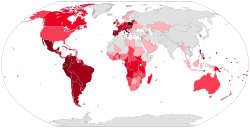| Part of a series on the |
| Catholic Church by country |
|---|
 |
|
|
The Catholic Church in Cuba is part of the worldwide Catholic Church, under the spiritual leadership of the Pope in Rome. Catholics make up approximately half of the population of Cuba.[1]
History
Catholicism has historically been the majority religion since Cuba's colonization. However, Communist Cuba is no exception to the ideological clash between Communism and religion that was common in communist countries. After Fidel Castro's ascent to power in 1959, he imposed restrictions on religious activities such as Christmas celebrations, and in 1962 barred personnel of the Church from joining the Communist Party of Cuba - following a communist tradition of Marxist-Leninist atheism.[2] However, Castro's efforts were not as successful as in traditionally communist countries such as the USSR or China.
When the Cold War ended, such restrictions were lifted and the atheist guidelines outlined in the Cuban Constitution were removed. Catholics have been able openly join the Party since 1990. In 1998 Pope John Paul II made an official visit to Cuba and met Fidel Castro in person. Castro honored the Pope publicly. Pope Benedict XVI visited in 2012, meeting both Fidel and Raúl Castro, as did Pope Francis in 2015.
Current status
The Catholic Church body in Cuba is governed by the Cuban Bishops Conference. There are over six million Catholics - around 60.5% of the total population[3] - although only about 2% attend mass.[4] The country is divided into three archdioceses[5] and eleven dioceses.
The Catholic Church in Cuba has taken on a more politically active role than in many other countries. It claims to have engaged in discussion with the government on issues such as political prisoners and free market reforms.
Catholics in Cuba have greater religious freedom than those in other Communist countries such as China, Laos, North Korea, and Vietnam.[6][7]
2025 Jubilee
Following a meeting between Pope Francis and President Miguel Díaz-Canel in August 2022, Cuba released more than 500 prisoners from their sentences to honor the Catholic Church's 2025 Jubilee Year. According to President Díaz-Canell, in his statement accompanying the prisoner release, Cuba maintains “a respectful, frank, and constructive relationship with the Vatican and the Supreme Pontiff, which facilitates decisions such as the one recently taken.”[8]
Structure
See also
- Conference of Catholic Bishops of Cuba
- List of Central American and Caribbean Saints
- Religion in Cuba
References
- ^ Latinobarometro, Opinion Publica Latinoamericana, Enero 2018.
- ^ "Pilgrim Pope: Pope Benedict XVI to Visit Cuba, Perhaps Mexico in 2012". Catholics Online. 11 December 2011. Archived from the original on 6 February 2012. Retrieved 12 December 2011.
- ^ US Conference of Catholic Bishops website, The Catholic Church in Cuba, retrieved 2024-01-05
- ^ France 24 website, Catholic Church gains foothold in communist Cuba, dated June 28, 2021
- ^ Encyclopedia.com website, Cuba, the Catholic Church in
- ^ Freedom House website, 2023 report on Cuba
- ^ Freedom House website, 2023 report on China
- ^ https://www.vaticannews.va/en/world/news/2025-01/cuba-to-release-prisoners-in-the-spirit-of-the-jubilee.html









You must be logged in to post a comment.